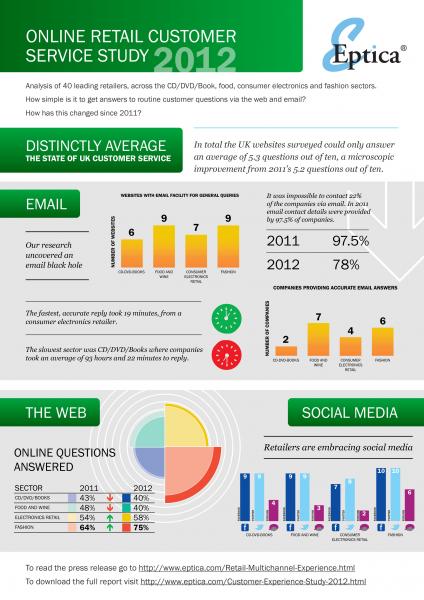Retail customers facing email black hole this Christmas
Study uncovers growing chasm between best and worst online retail customer experience
Reading, 6 December 2012: In the run up to Christmas, UK retailers are frustrating shoppers with distinctly average customer service, according to a new study released today. Despite UK online Christmas sales expected to exceed £4.6 billion , top UK retailers are failing to answer questions asked online or sent via email, according to the 2012 Eptica Multichannel Customer Experience Study. The research found that just 48% of retailers could successfully answer basic questions sent via email, while websites could answer just over half (53%) of questions asked online.
The research, carried out by multi-channel customer interaction management software provider Eptica, evaluated 40 leading retailers, spanning the CD/books/DVD, consumer electronics, food and fashion sectors. They were tested on their ability to provide answers to 10 routine questions via the web as well as their speed and accuracy when responding to enquiries sent via email.
It was impossible to contact nearly a quarter (22%) of the companies in the study via email, as they either had removed the opportunity for non-customers to contact them through this channel or email addresses could not be easily found. This was a dramatic change since 2011, when 97.5% of retailers provided email contact details. And it also risks breaking the law - UK Distance Selling regulations state that online retailers must provide an email address on their sites .
Poor email performance continued when it came to response times. On average it took retailers 66 hours, 52 minutes to answer emails, a whole day (24 hours) longer than in 2011. One retailer took over 1 month to reply to an email – although another responded in just 19 minutes, delivering a real competitive advantage. Slow responses have a direct impact on Christmas shoppers, delaying purchases and potentially meaning presents will not be delivered on time.
There was a growing gap between best and worst when it came to online customer service. For example, fashion companies answered three quarters (75%) of questions asked on their websites, while CD/DVD/Booksellers and food retailers scored just 40%. Demonstrating the increasing chasm between companies, one food retailer scored 100%, answering all ten questions successfully – however three companies in the same sector scored just two out of ten.
“In such a competitive sector, a good Christmas can make the difference between survival or failure for hard-pressed retailers,” said Dee Roche, VP, Global Marketing, Eptica. “Delivering a first class customer experience is central to winning and retaining sales, but our research found that while some retailers are excelling at service, many seem to be unable to provide answers to even the most basic of questions. It is particularly worrying to see that a rising number of retailers are making it more difficult for customers to contact them via email – not only does this potentially break the law, but it forces consumers to change channels and risks them going elsewhere.”
Social media is now a growing channel for customer service – and retailers are embracing it fully. The study found that since 2011, social media use has increased dramatically – 90% of retailers now provide links to their Twitter accounts and 88% have Facebook pages (up from 58% on both networks in 2011). 8% of retailers link customer service to social media channels, allowing shoppers to ask questions of the wider community. This shows there is still room for improvement as retailers look to integrate social media into their wider customer service strategy.
To view an infographic that sums up the results click here and to download the study click here.




